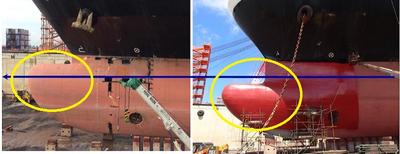MTI and NYK Devise Energy-saving Adjustments that Significantly Reduced Emissions from Containerships
Monohakobi Technology Institute (MTI) and Nippon Yusen Kabushiki Kaisha (NYK) have made energy-saving adjustments to a containership resulting in a verified 23 percent reduction in carbon dioxide (CO2) emissions over half a year, greater than the amount estimated prior to the tests.
To reduce energy consumption, containerships often sail at a speed that is much slower than the average speed anticipated when the ship was designed and built. To make existing ships more energy efficient at these slower speeds, MTI and NYK has been conducting research since the summer of 2013, studying measures such as remodeling the ship’s bulbous bow* and installing MT-FAST.**
Big Data analyses using actual voyage data gathered over half a year after the implementation of improvements in June 2014 were conducted by MTI and NYK, and a 23% reduction in CO2 emissions was subsequently certified by the ship classification society ClassNK. The conversion was also verified not to affect the safe operation of the vessel or the operating condition of the engine.
This adoption of energy-efficient technology is being supported by a grant provided through the Maritime Port Authority of Singapore’s Green Technology Programme and also supported by the ClassNK Joint R&D for Industry Program.***
MTI and NYK will also aim for further energy savings by containerships by proceeding with construction based on this new approach now that effective methods (patent pending) for these operating conditions have been established.
MTI and NYK will continue its efforts to devise creative solutions in the environmental fields based on the company’s medium-term management plan “More Than Shipping 2018.”

Remodeling of the ship’s bulbous bow
(Left:Before remodeling)(Right:After remodeling)
* Bulbous bow A protruding bulb at the front of a ship just below the waterline. The bulb modifies the way the water flows around the hull, reducing drag and thus increasing speed, range, fuel efficiency.
** MT-FAST A fuel-saving device fitted to the submerged part of a vessel’s hull to maximize the vessel’s propulsive efficiency, thus resulting in fuel savings.
*** ClassNK Joint R&D for Industry Program Provides research support and funding for joint research projects that address challenges faced by the maritime industry.
http://www.nyk.com/english/release/3710/003829.html
Monohakobi Technology Institute
Administration Group
TEL: +81-3-5222-7650
E-mail: info@monohakobi.com
